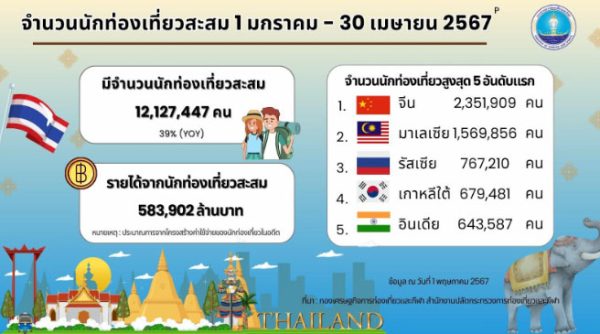BANGKOK, 6 May 2024: Thailand is revisiting a controversial THB300 tourism tax proposal that has been on and off the table for five years.
The Federation of Thai Tourism Association recently confirmed it is preparing a white paper on the pros and cons at a time when the country is expecting record visitor arrivals that could breach the 40 million mark by the end of 2024.

Resurrecting the tourism tax proposal for yet another review could gain traction this time as the country faces an unprecedented boom in tourism. It has sparked calls for a fund to restore and reverse negative impacts on natural and cultural assets. Ministry of Tourism and Sports’s latest release indicate the country welcomed 12,127447 visitors from 1 January to 30 April 2024, an increase of 39% compared with the same period in 2023. Revenue earned from the visits was estimated at
THB583,902 million. This outstanding performance is reminiscent of past Visit Thailand Years, which pushed arrival increases into the double-digit zone.
The Federation of Thai Travel Tourism Association is ready to support the introduction of the tax, marking a significant change of heart. In the past, the proposal failed to attract attention from associations representing tourism’s private sector, particularly during the post-Covid recovery years due to the colossal losses incurred since 2020.
However, support for the government to implement a new tax to curb overtourism will be short-lived if the collection process is inconvenient, creating long queues at airports or land checkpoints. Then there is the question of transparency. The only practical option to ensure transparency is to add the tax to the cost of airline tickets and offer a handling fee to the airlines for managing the process. That would leave the thorny issue of how to collect the tax from travellers at land borders. Considering the collection costs and inevitable leakage, exempting overland travellers might be more feasible until there is a scam-proof digital solution to pay the fee directly to an online government wallet. It would also be an incentive to encourage visitors to explore lesser-known destinations using land transport.
The ministry snapshot of the top five source markets ranked China top with 2,351,909 visits followed by Malaysia (1,569,856), Russia (767,210), South Korea (679,481) and India (643,587).
The figures are based on preliminary data from the Immigration Bureau at airports and overland checkpoints, excluding border pass travellers.
Meanwhile, the Tourism Authority of Thailand reported Q1 data (January to March). Visits reached 9,381,098, up by 1.3 million compared with Q1 2023, a 44% increase.
Factors supporting the surge in visits included a robust turnover of visitors during the Chinese New Year Festival, driven by visa-free entry and the introduction of more flights on routes from China, promotional campaigns in key source markets, and the impact of concerts and special events. However, rising international airfares continued to impact travel to Thailand.






